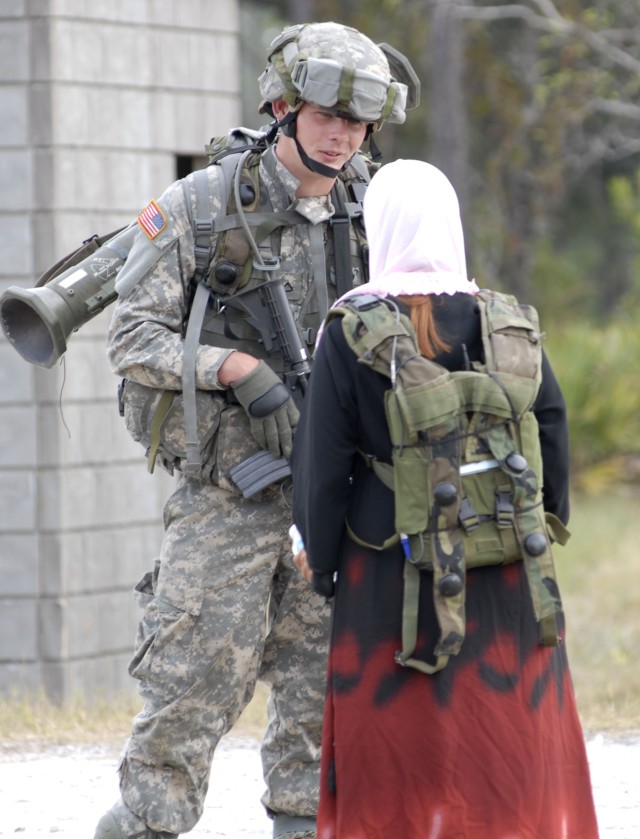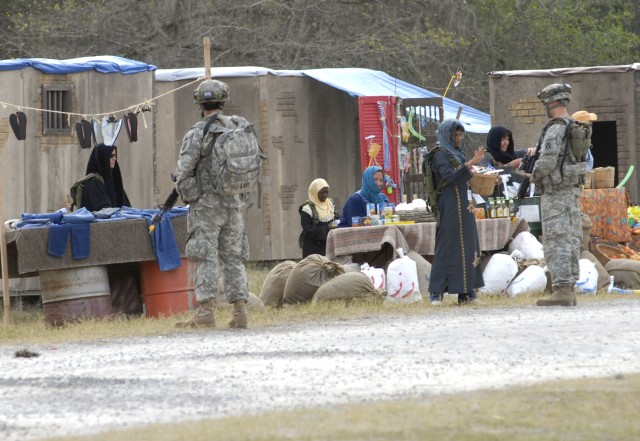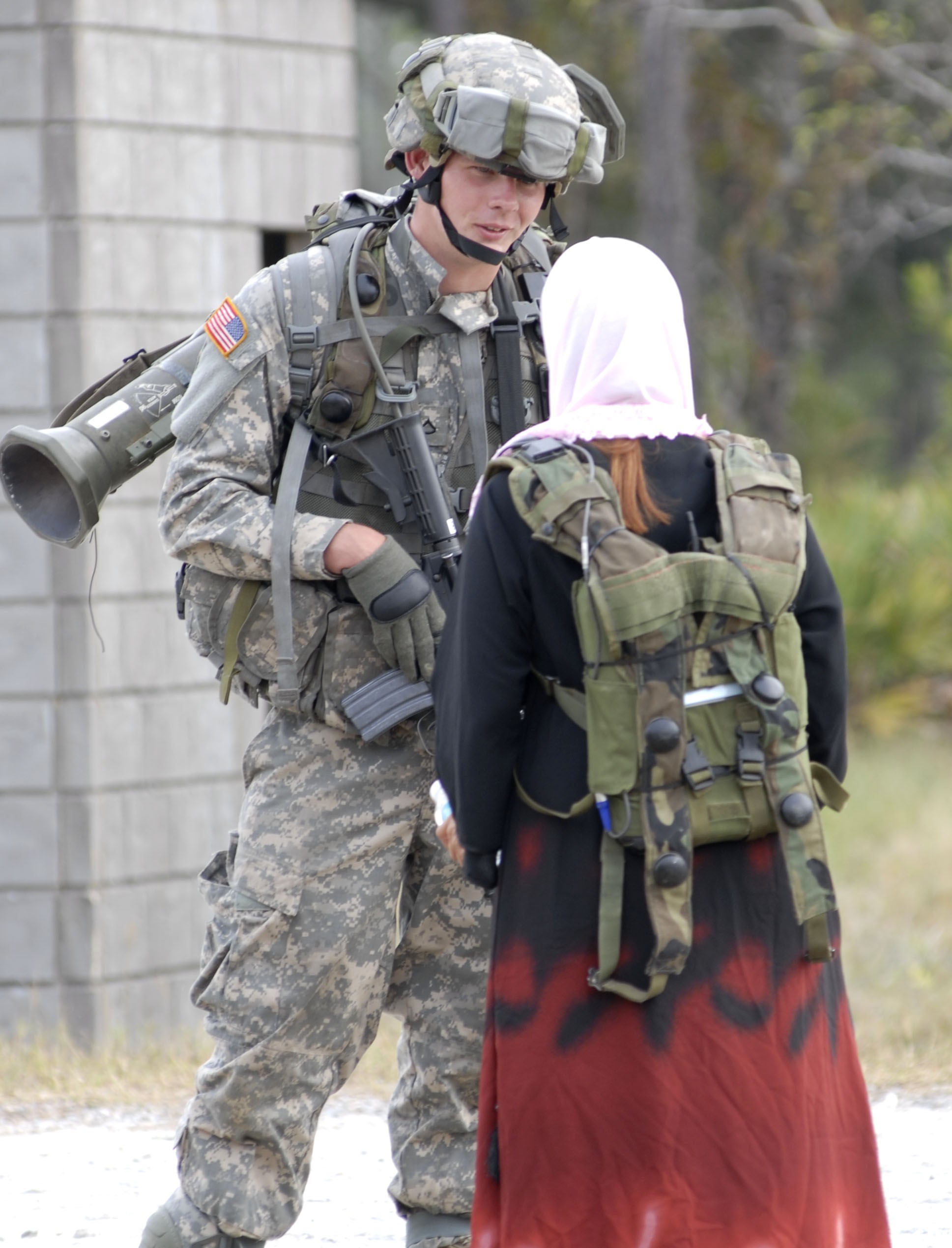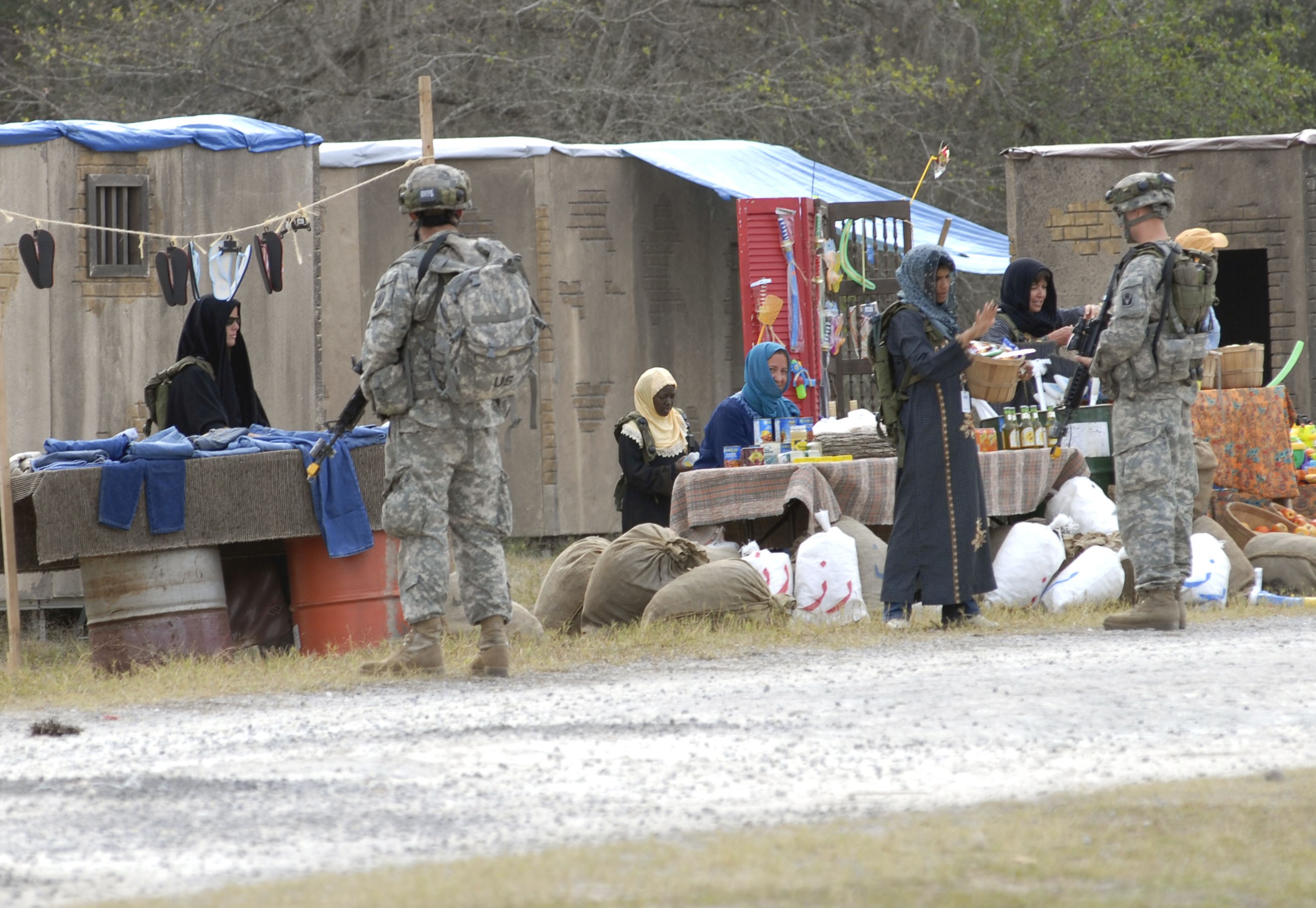CAMP BLANDING JOINT TRAINING CENTER, Fla. (Nov. 4, 2009) - Nawal Al-Saedi knows that words can cause death.
She knows the slightest gesture, misinterpreted, can turn a peaceful meeting into something lethal.
She also knows her job can save the lives of U.S. Soldiers and Iraqi civilians if she is successful. When she shows up for work each morning, she takes her role as both actress and teacher very seriously.
Al-Saedi is an Arabic-speaking role-player assisting the Florida Army National Guard's 53rd Infantry Brigade Combat Team as it prepares for a 2010 deployment to Kuwait and Iraq.
Al-Saedi and nearly 50 other role-players added authenticity to exercises during the 53rd's preparations at Camp Blanding Joint Training Center in October and November.
The team of role-players, mostly Iraqi nationals and expatriates, gave color to the tactical portions of the Soldiers' training by wearing typical Iraqi garb, speaking Arabic and portraying average Iraqis when meeting U.S. troops.
"I've been really trying to help these guys: show them where they're right, where they're wrong," the Kuwaiti-born Al-Saedi said.
Wearing an Army Combat Uniform, gray running shoes and a black motorcycle helmet, she was getting ready for a role she knows intimately, an Arabic translator for U.S. combat troops.
As she put on a pair of darkly tinted safety glasses, she explained that she had moved from Kuwait to Iraq in the early 1990s, and after studying English she served as a translator for Soldiers in Iraq during 2006 and 2007.
Al-Saedi's smile left briefly as she talked about facing rocket attacks while working with U.S. forces in Iraq, and how she later fled to the U.S. with her husband and three sons on a special immigrant visa after their lives were threatened.
"It wasn't that easy," she said. "But I'm a strong lady and I can face a lot of trouble, because that's how life has taught me how to solve my problems by myself."
In 2008 Al-Saedi signed on with California-based company contracted by the National Guard Bureau to provided realistic training scenarios for Soldiers deploying to Southwest Asia.
This job is an opportunity for her to use her past experiences, knowledge of Iraqi culture, and proficiency in Arabic and English to teach U.S. Soldiers. If she can show the Soldiers the correct way to address cultural nuances while "in country," they may be able to foster better relationships with the locals, she said.
"I can show them what's going on in the real life," she explained. "I just (arrived) from Iraq; I know what's going on - it's only been a year and a half."
The Soldiers appreciate her help such as teaching them how to deal with gender or religious issues in an Islamic society and she feels the training will help save lives by preventing confusion in what are often volatile situations, she said.
"That is what we're trying to show these people before (they) deploy, and it's helped," Al-Saedi said. "We don't want to lose more from both sides...we need to build a friendship."
A short time later, Soldiers from B Company, 2nd Battalion, 124th Infantry Regiment, accompanied Al-Saedi into a mock-up of an Iraqi village on Camp Blanding. In the village, women in dark hijab head coverings sold fruit and household goods from outdoor stalls; men played soccer in the street; and worried faces peered from doorways of weather-beaten buildings at the approaching Soldiers.
During the exercise, Al-Saedi stayed close to the platoon leader as he met with the village sheik simulating missions the unit may encounter in Iraq. A few hours of training, explaining cultural differences and translating phrases, could prevent miscommunication and disaster when the unit is actually in Iraq.
Another role-player, who was hoping to ease the clash of cultures by teaching the Florida Guardsmen, was 21-year-old Sarmad Jasim. A native of Iraq who spent much of his adolescent years witnessing war and sectarian violence, Jasim came to the U.S. last year with his family as refugees.
It was difficult growing up and seeing so much chaos and bloodshed so when given the opportunity to be a role-player, he knew it would be "a chance to do something" good, he said.
"(We) make them understand how things are over there, how the people would act when they come, how they expect people to act with them," Jasim said of his interaction with the Soldiers at Camp Blanding.
He learned English while growing up in Baghdad and was surprised that some of the Soldiers can already speak a few Arabic phrases, he said.
"Some of them do, some do not," he explained. "I've seen some of them speaking really good Arabic. I was surprised the other day."
According to Michael LiDondici, supervises the role-players, many of the Soldiers from the 53rd Infantry Brigade Combat Team have demonstrated a high-level of knowledge of Iraqi culture during the training. He attributes this to many of the Soldiers that have already deployed to Iraq or Afghanistan.
"So far this has been some of the best training we've seen," LiDondici said. "These Soldiers are more experienced than perhaps some of the Soldiers we've seen in the past and they're on their game."
LiDondici, whose background is in the film industry, notes that while his company provides battlefield effects for training - including the IED simulators and scaled-down versions of Iraqi villages, live Arabic-speaking role-players are what make the training so effective.
"They are our stars of the show. If you put it in terms of the film industry standard you have your principal roles and then you have your background or your extras," he said.
"The role-players are the principal roles. They portray a sheik, or an imam, or a police chief, and they are the key leaders that the training audience will interact with on the lane."
Many of the Iraqi nationals who work with him as role-players took the job because they are concerned with protecting the lives of those Iraqi people who are still in country and those who may be helping the U.S. forces over there, he said.
"They are genuinely concerned with a democratic success in Iraq," he added, "and they feel...that the best chance for that democratic construct to take hold is to give us a hand."
53rd Infantry Brigade Combat Team Commander Col. Richard Gallant, who will lead 2,500 Soldiers during the upcoming deployment, said the Iraqi role-players have added a realistic element to the training he hasn't seen before past deployments.
"The role players have been absolutely critical to our training success," Col. Gallant said.
"From working with interpreters to managing the cultural and religious differences, they have created a level of realism we generally don't see prior to deployment."




Social Sharing